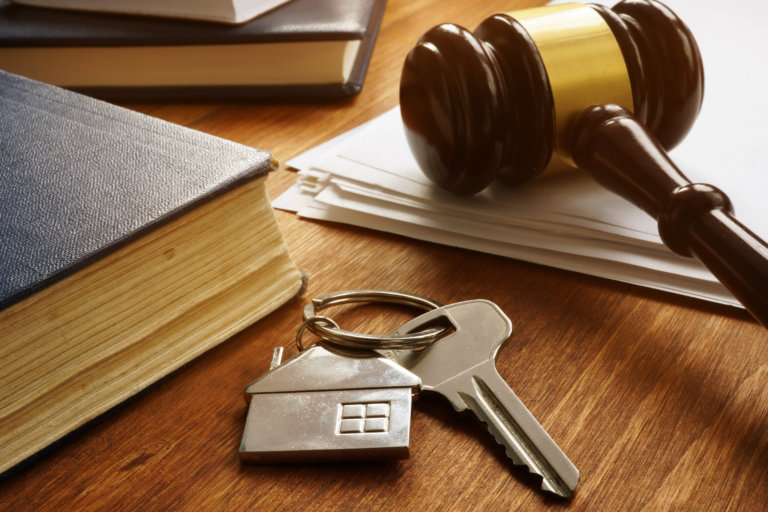Quitclaim Deeds are typically used in real estate transactions involving family members or close friends, or when little or no money is being exchanged for a transfer of title. Unlike Warranty Deeds, Quitclaim Deeds do not guarantee that the property title is clear of defects, which requires a higher level of trust between the parties involved in the transaction.
However, there is more to a deed and title transfer than simply signing a deed. Several steps must be taken for the deed to be valid under Florida law—otherwise, the new titleholder may not be legally recognized as such.
Step-by-Step Guide to Preparing and Filing a Quitclaim Deed
- Obtain a Copy of the Current Deed of Property
The first step to file a Quitclaim Deed is to pull a copy of the property’s current deed, which will contain the legal description of the property and the current ownership. Without the legal description, the Quitclaim Deed cannot be completed, let alone valid.
The property owner might have to visit the county clerk’s office to obtain a copy of the current deed, while other counties make their public records available online. However, using the current legal description has its risks because the legal description may have changed or may not have been accurately described to begin with. A survey and a current title search can help mitigate that risk. Furthermore, if title has changed hands several times without a title search being completed, it is best to obtain a title search so that the true owner of the property can be verified.
- Prepare the Quitclaim Deed
When preparing the Quitclaim Deed, it is important that not only the full legal description is provided, but that certain other information is also included, such as:
- Who is the person preparing the document;
- Where the document should be delivered to once recorded;
- The grantor’s name and address (the grantor is the individual or entity who is conveying their ownership interest);
- The grantee’s name and address (the grantee is the individual or entity who is receiving ownership);
- The property’s parcel identification number and address; and
- The amount paid in the transaction associated with the deed.
Certain other nuances exist as well if a corporate entity or a trust is involved. Also, if there is an underlying mortgage or money is being exchanged for the transfer of ownership, a transfer tax must be paid with the Florida Department of Revenue. If any of this information is missing, unclear, or incorrect, it may render the deed invalid.
- Sign the Quitclaim Deed Before a Notary and Witnesses
Once the Quitclaim Deed is properly preparing, the person who is transferring their title interest must sign the deed before a notary and two witnesses. The notary can serve as one of the witnesses, but they must sign both in the witness section and in the notary section.
- Record the Deed
Once the deed is signed and notarized, it is important to make copies for your records and have the original filed and recorded in the public records of the county where the property is located.
Total Costs and Expenses
Every county in Florida charges a recording fee, which is typically $10 for the first page and $8.50 for each additional page. Most deeds are no more than two pages, so the typical cost is $18.50. If the deed is electronically recorded, the fee is slightly higher.
There is also a documentary stamp tax that has to be paid at the time that the deed is recorded, which is $0.70 for each $100 of the total amount involved in the sale or transfer of the property. For instance, if $100,000 in being given to the owner for the title transfer, this would result in $700 of documentary stamp tax.
Note that the documentary stamp tax is different in certain counties. In Miami-Dade County, for example, it is $0.60 per each $100 of the transaction’s total amount. Moreover, if the transferred property is not a single-family residence, the county requires a surtax of $0.45 per $100. Furthermore, if there is an underlying mortgage on the property, a tax has to be paid as well for that at the time of recording.
Finally, bear in mind that tax rates and fees change, so it is crucial to do your research—or to hire an experienced Florida real estate attorney who knows how to handle these matters.
Need a Quitclaim Deed in Florida? – Work With Farshchian Law
It is crucial to note that taking title via a Quitclaim Deed is risky. With a general Warranty Deed, the person transferring ownership of the property guarantees that the title is free of defects (e.g., liens, judgments, etc.) and that they have the right to transfer the title in the first place. Accordingly, if the seller is wrong, the new owner can seek legal relief.
By contrast, a Quitclaim Deed makes no “warranty” as to the title or ownership rights, and thus offers no recourse in cases where the title is later revealed to have defects. Therefore, Quitclaim Deeds are best used amongst family members or when little or no money is being exchanged for the title transfer.
Given the uncertainty and risk involved, it is always recommended to consult with an experienced and knowledgeable Florida real estate attorney to discuss the different types of deeds and which one is the best option for you. Call us at (800) 604-1871 or email us at Info@JFRealEstateLaw.com for a free consultation on our deed transfer, title/closing, and other real estate services.

